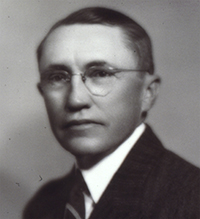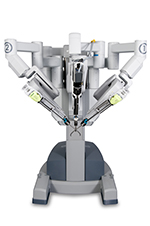Dr. Herman Watson was born on a farm near Metter, Georgia in 1889. He achieved his medical degree from the University of Georgia in 1912. Two years later, after completing his postgraduate medical studies, he arrived in Lakeland and opened his own practice.
 He proudly answered the call of duty in 1917 when he entered the Army during World War I. When he returned from the battlefield, he soon assembled a core group of medical specialists with which to practice alongside. These included his nephew and fellow surgeon, Dr. Samuel Edgar Watson, and internal medicine specialists Dr. Jere Annis, a Minneapolis native and World War II veteran, and Dr. Henry Fuller, a Harvard educated physician from Mulberry. A fifth colleague, a urologist named Dr. John Kibler, was also drafted fresh out of Johns Hopkins University Medical School. Eventually, these five extraordinary physicians would form the Watson Clinic in 1941.
He proudly answered the call of duty in 1917 when he entered the Army during World War I. When he returned from the battlefield, he soon assembled a core group of medical specialists with which to practice alongside. These included his nephew and fellow surgeon, Dr. Samuel Edgar Watson, and internal medicine specialists Dr. Jere Annis, a Minneapolis native and World War II veteran, and Dr. Henry Fuller, a Harvard educated physician from Mulberry. A fifth colleague, a urologist named Dr. John Kibler, was also drafted fresh out of Johns Hopkins University Medical School. Eventually, these five extraordinary physicians would form the Watson Clinic in 1941.
“They believed in the potential of Lakeland and its people,” says Dr. Louis S. Saco, the chief executive officer and a practicing gastroenterologist at Watson Clinic. “They wanted to ensure that our community had access to the same level of expertise, technologies and cutting-edge treatments that were available to people in the largest metropolitan cities.”
They started their enterprise in the historic Marble Arcade Building in downtown Lakeland. As their popularity flourished, so did their need for larger space. Plans were drawn for a stand-alone facility – the Main Clinic at 1600 Lakeland Hills Boulevard – which still serves as the central hub of Clinic operations to this day.
Dr. Watson had retired four years earlier, but he was nevertheless front and center during the dedication ceremony of the Main Clinic location in 1958.
“No one can begin to appreciate our pleasure in the dedication of this building to Dr. Herman Watson – founder of this Clinic, beloved associate to its physicians and early symbol of modern medicine in this area,” co-founder Dr. Annis observed that day.
Those in attendance - including Dr. Watson, Dr. Annis, and a variety of the most distinguished residents and business leaders in the area - could not have imagined what Watson Clinic would become in the years that followed. Dr. Alton Ochsner, founder of the renowned Ochsner Clinic in New Orleans, was there to lay the cornerstone of the building.
Today, the legacy set in motion by these pioneering physicians has blossomed into one of the largest and most respected medical clinics in the Southeast.
Physicians, Providers and Locations
What began as a core group of five esteemed physicians has grown into a team of over 250 physicians and providers whose areas of expertise span across more than 40 medical and surgical subspecialties. A large team of hospitalists also offers services to patients at various hospitals across the region, including Lakeland Regional Health, Bartow Regional Medical Center and South Florida Baptist Hospital in Plant City.
The Clinic’s board-certified physicians are recruited from the most respected medical schools across the globe. They join the Clinic family to fulfill a need within the community. “We are always cognizant of the healthcare needs and interests of the patients we serve,” says Dr. Saco. “That’s reflected in the caliber and diversity of the specialists we bring into the Watson Clinic, the convenience of our locations, and the ease of access for our patients.”
Location, location, location
The Clinic’s current roster of 17 healthcare facilities are strategically located across Polk, Pasco and Hillsborough counties,  including family medicine practices in Bartow, Winter Haven and Plant City and dermatology offices in Zephyrhills and Sun City Center. Particularly popular offerings are the walk-in care services, which are available from the Urgent Care department at the Main Clinic and the XpressCare office in Highlands.
including family medicine practices in Bartow, Winter Haven and Plant City and dermatology offices in Zephyrhills and Sun City Center. Particularly popular offerings are the walk-in care services, which are available from the Urgent Care department at the Main Clinic and the XpressCare office in Highlands.
Watson Clinic South – first constructed in the 1980s to serve south Lakeland residents – has become a patient favorite for the delivery of family medicine, pediatrics, allergy, dermatology, podiatric surgery, and psychiatry services. In 2003, Watson Clinic Cancer & Research Center was constructed, the area’s largest collaboration of oncology specialists.
Innovation
The world of medicine moves at a rapid pace. Whether it’s a new technology, groundbreaking treatment or more efficient means of providing patient care, Watson Clinic has always remained firmly committed to delivering only the most highly advanced services available.
For example, Watson Clinic’s cardiology department alone has been responsible for introducing many of the field’s most consequential innovations to our area, including the treadmill stress test, echocardiography, electrophysiology, pacemaker services, and heart catheterization. On the cardiothoracic and vascular surgery front, they were the first in the area to offer groundbreaking procedures like open heart surgery.
Watson Clinic was the first to deliver game-changing 3D mammography to our community, and many more of the most powerful radiologic imaging systems in the industry, including MRI, PET and CT PET scans. These technologies have ensured that disease can be detected and targeted at earlier stages, resulting in better patient outcomes and improved survival rates.
 The Clinic has also introduced our community to the wonders of robotic technologies. Heralded for its unparalleled precision, surgical robotics result in less invasive procedures, significantly reduced trauma to the body and faster periods of recovery. Watson Clinic physicians were the first in the state to perform robot-assisted bladder removal surgery, and the first in Polk County to successfully complete a hysterectomy utilizing these revolutionary robotic tools. Gynecologic oncologist Dr. Richard Cardosi was singled out as one of the top ten practitioners of robotic surgery in the entire nation.
The Clinic has also introduced our community to the wonders of robotic technologies. Heralded for its unparalleled precision, surgical robotics result in less invasive procedures, significantly reduced trauma to the body and faster periods of recovery. Watson Clinic physicians were the first in the state to perform robot-assisted bladder removal surgery, and the first in Polk County to successfully complete a hysterectomy utilizing these revolutionary robotic tools. Gynecologic oncologist Dr. Richard Cardosi was singled out as one of the top ten practitioners of robotic surgery in the entire nation.
This devotion to innovation extends to the realm of research as well. The Watson Clinic Center for Research was the first of its kind in our area, offering patients the most promising clinical trials for conditions as diverse as atrial fibrillation, lung cancer and gastrointestinal diseases.
Recognition
Following the formation of Watson Clinic, it wasn’t long before the medical industry at large began to take notice. In 1969, they were the first facility in the United States to be accredited by the American Association of Medical Centers. In the intervening years, they’ve maintained accreditations from many of the most prestigious organizations in healthcare, including the Accreditation Association for Ambulatory Health Care, and the National Committee for Quality Assurance, which as ranked Watson Clinic as a Level 3 Patient Centered Medical Home.
Throughout Watson Clinic’s rich 75 year history, they have continued to grow in response to the growing medical needs of our community. Their operations may be more wide-reaching than they were in 1941, and the technologies they employ much more sophisticated, but their mission remains unchanged from those set forth by their founding fathers all those years ago. They will continue to deliver the most advanced care available, and do so with the small-town values that make patients feel like they’re part of a larger family.